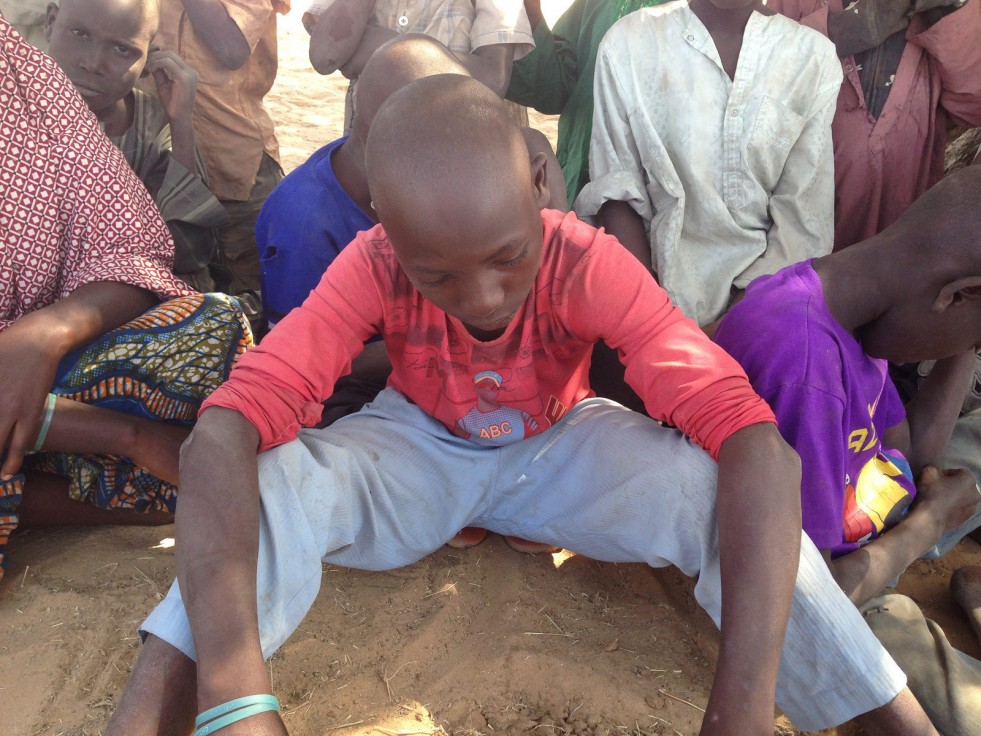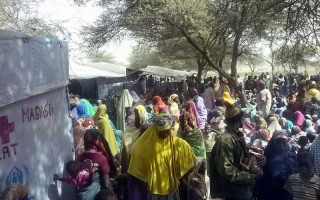
The thousands of Nigerians who have fled to Chad include children separated from their families. They are often traumatized and need special care and time to recover. © UNHCR/M.F.Farmaian
DAR ES SALAM CAMP, Chad, February 5 (UNHCR) – Since militants attacked the Nigerian town of Baga a month ago, more than 14,000 people have found safety in Chad, including hundreds of children who are still suffering.
Many, like 15-year-old Ismail, have been separated from their parents and placed with host families by UNHCR. They are still haunted by the trauma of their escape from the north-eastern town located in Borno state near Lake Chad.
At the Dar es Salam site, allocated by the government of Chad to accommodate the growing number of Nigerian refugees, a dozen children sit on a straw mat under the shade of an acacia tree. They arrived here three weeks ago and cannot forget the moment they fled.
“‘We are closing the school, Boko Haram is coming,’ the teacher yelled,” recalled Ismail. “Then I heard explosions and the sound of machine guns. The teacher told us to go home right away.”
But for Ismail, and thousands of others, home was no safer. “My mother and I ran towards the lake, but we couldn’t find a canoe [at first]. I remember the sound of gunfire as we ran along the shore. Bodies were scattered everywhere.”
The teenager eventually found a place on a boat and spent two days crossing Lake Chad. To him, it seemed to take forever. “I was very hungry and I couldn’t sleep,” he told UNHCR visitors. Not much has changed since his arrival in Dar es Salam. “I am still hungry,” he lamented, picking unhappily at the straw mat.
Like many others, Ismail’s family was forced to flee in all directions. As a consequence, he has no idea where his mother, father or siblings are. UNHCR, together with the local authorities, is monitoring the arrival of Nigerian refugees across Lake Chad and moving them to the Dar es Salam site.
UNHCR is also working closely with the International Committee of the Red Cross to trace family and to reunite separated refugee children with relatives in Chad.
In the Dar es Salam site, UNHCR and its partners provide refugees with food, water, shelter and basic household items. All refugees are vaccinated, children are given vitamin A supplements and those with nutritional concerns are referred for appropriate care.
“In Dar es Salam, UNHCR gave us soap and told us that we should wash our hands regularly with soap and water to keep clean and healthy,” said Ismail.
UNHCR is also working with partners, including the Chadian Ministry of Education and the UN Children’s Fund (UNICEF), to ensure that newly arrived Nigerian children are provided access to education in Dar es Salam.
There are currently 17,000 Nigerian refugees in Chad, including the 14,000 from the Baga exodus. More than 2,580 live in Dar es Salam.
Today, Ismail lives with a host family, his former neighbours. He is still getting used to his new surroundings. Other than his family, the thing he misses most is school. “I would like to become a doctor, then I can help the sick and wounded people at home,” he concluded.
By Massoumeh Farman-Farmaian in Dar Es Salam Camp, Chad



